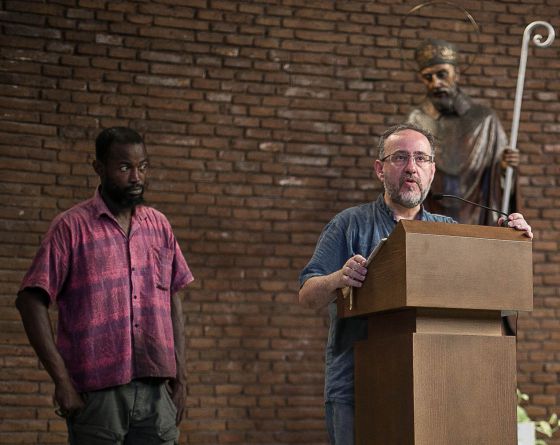
THINK Spain on Sunday and for many this conjures up an image of families soberly dressed, starting the day worshipping in their local churches. Old and young alike brought together by tradition, religion and community.
But the deeply religious roots that have long been part of Spanish culture are being severed and instead of packed churches, clergymen are increasingly preaching to rows of empty pews, their sermons echoing round silent churches where congregations have gradually disappeared.
Spain’s younger generation is firmly turning its back on religion and, while this is not surprising, the growth of atheism in a country with a history of religious fervour certainly is, with almost half of young Spaniards aged between 18 to 24 claiming that no religion is their religion.
Decline in religion is a worldwide phenomenon.
According to The Guardian newspaper, 70% of 16-29 year-olds in the UK identify with no religion.
Around two thirds of people in this age range say they never pray.
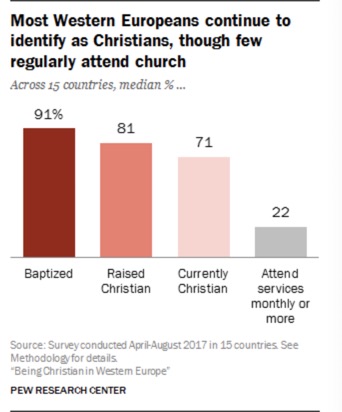
Leading the faithless field in Europe, France and the Czech Republic come just under China and Japan in The Independent newspaper’s list of countries with the most ‘convinced atheists.’
Atheism is no longer a hidden minority – in fact, Europe’s Christian population is forecast to drop by 100 million people in the next 30 years, according to a study conducted by Pew Research Center, a respected research and analysis organisation in Washington, USA.
Pew’s study takes into account factors like migration between Asia and Europe, the fertility levels of women of different religions, as well as the average ages of current religiously affiliated people.
The numbers are so substantive that no religion at all was called the ‘world’s newest major religion’ by National Geographic just a few years ago.
According to the Pew Research Center, non-religious people (labelled the ‘nones,’ an ironic homonym) make up a stunning 16% of the world population.
Non-religious groups have become so prominent that they are often referred to as their own grouping entirely — the ‘nones’ actually come in second place as the largest “religious group” in almost half of the world’s countries. This grouping includes those who do not identify with any official religion, including atheists, agnostics and those who practice a mix of religions or spiritual practices.
This rapid movement towards atheism, coupled with the less surprising finding that the majority of churchgoers are from older generations, does not bode well for the future of European Christianity.
Spain’s declining religious numbers are particularly interesting.
El Pais reported earlier this year that 27% of all Spaniards are among the ‘nones’. In contrast, 88.6% of the country’s 65-and-overs still ascribe to traditional religious beliefs, the most prominent of which is Christianity.
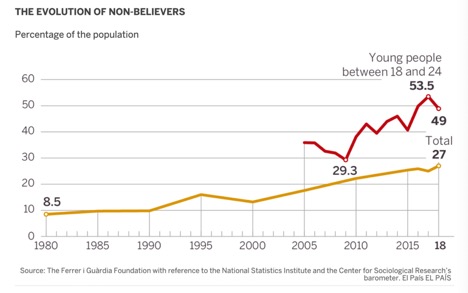
Church marriages have also declined steeply; in a 27 year-long period, the percentage of religious marriages in Spain declined from 79% to 19.8%, a huge drop of nearly 60 percent.
Martin Varsavsky, in the Huffington Post, goes to the history books to explain that one of the major factors behind the older generation’s religious adherence is the strong connection between Franco’s dictatorship and Spanish Catholicism. This age group still believe in God who was an obligatory element in their childhood lives under the Franco regime which lasted from the end of the Civil War until his death in 1975.
But following decades of democracy, Varsavsky believes ‘religion in Spain is mostly becoming tradition.’ He continues: “Sunday church attendance is in the single digits. In this country, they still teach religion in most schools, but to most it is as if they were teaching Spanish history, the history of a country that used to be religious but it is not anymore.”
According to Pew’s research, most western European adults still consider themselves Christian, even though they may be non-practicing.
This group still makes up a larger portion of society compared to the ‘nones’, showing how religion is adapted to fit the social and cultural views of many modern day adults. These non-practicing Christians do not believe in the ‘biblical definition of God,’ as practicing Christians do although they include elements of the religion in their daily lives.
But the clergy still hold out hope that there could be a reversal. Father Francesc Romeu remains optimistic, even though he has seen a decline in congregation numbers at his parish of Santa Maria de Taulat in the Barcelona barrio of Poblenou since he was ordained 34 years ago.
“The old people I had when I started out as a priest have died and now I have others who are retiring,” he told El Pais. “Their grandchildren are now older and there comes a day when they walk into the church and stay.”
Whether the growing tide of atheism sweeping across Europe will continue to empty church pews long term, only time will tell.
Or perhaps it’s in God’s hands.
Click here to read more News from The Olive Press.

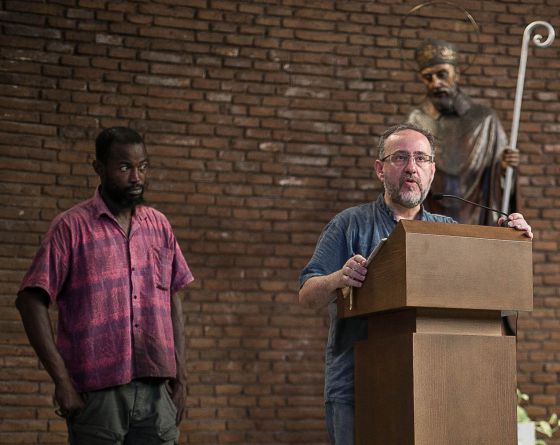

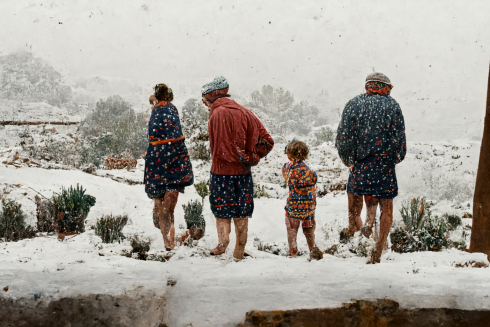
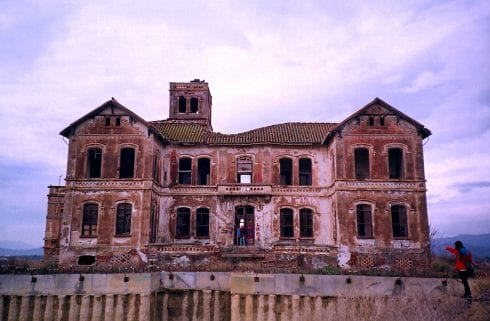




“declined from 79% to 19.8%, a huge drop of nearly 60 percent”.
Actually the drop should be expressed as a percentage of the 79% as this is the number at the beginning of the period. If you did 79 of something before and you do 19.8 now the number you do has fallen 59.2. 59.2 is 74.7% of 79.
“declined from 79% to 19.8%, a huge drop of nearly 75 percent”.